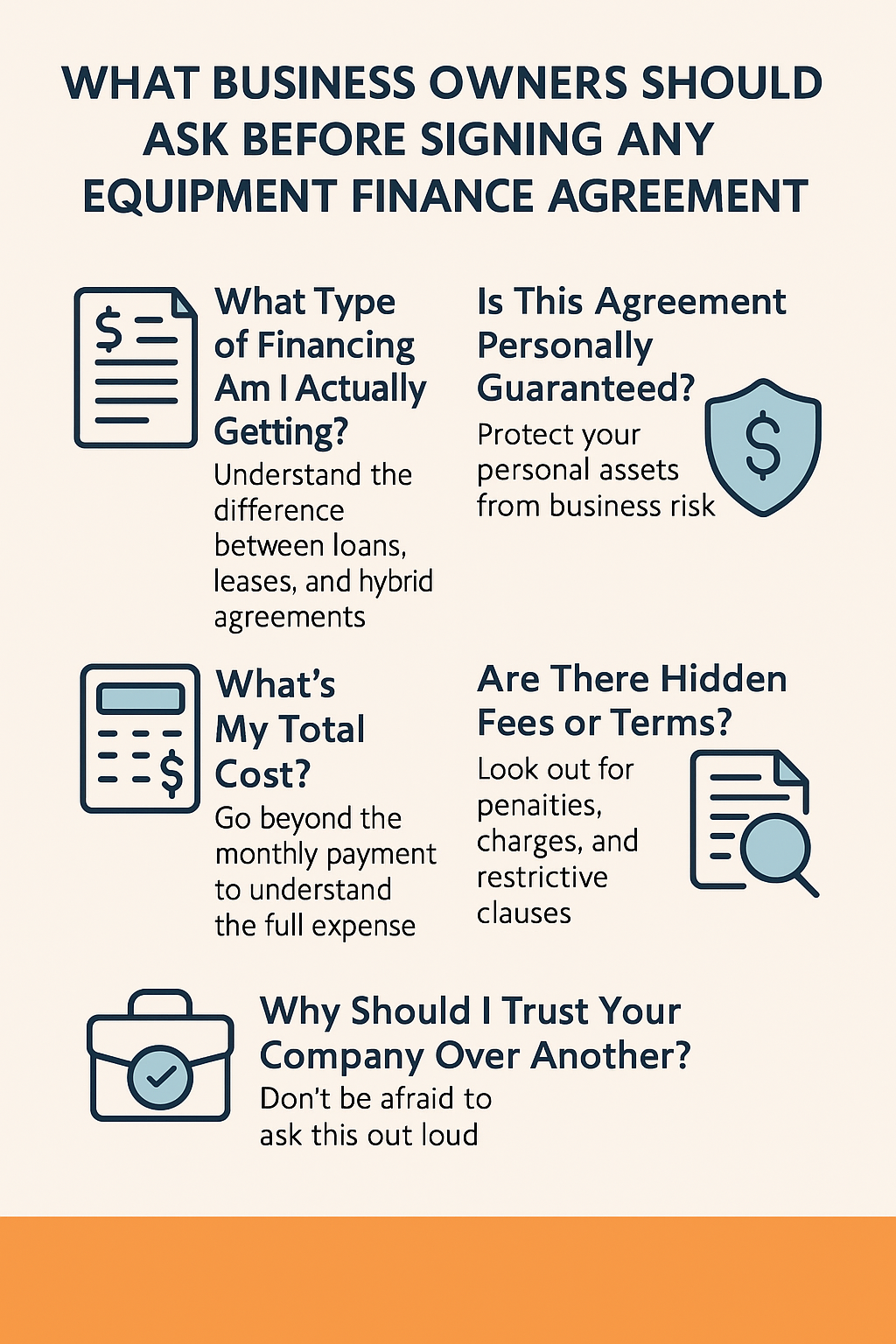When you’re deciding on equipment financing, it’s not just about getting funds quickly. It’s about choosing a partner who understands your business and protects your long-term interests. Asking the right questions before signing any agreement could save you thousands in hidden fees, contract traps, or missed opportunities.
Here are 10 essential questions every business owner should ask before agreeing to any equipment finance terms, along with real insight into what those answers mean.
What Type of Financing Am I Getting?
Understand the difference between loans, leases, and hybrid agreements
This is the first and most important question to ask because if you misunderstand what you’re signing, you could be stuck in a contract that doesn’t fit your business needs or goals.
At a glance, most equipment financing options look similar: monthly payments, a fixed term, and access to the equipment. But under the surface, the structure could be entirely different, and those differences impact your taxes, balance sheet, and long-term costs.
An equipment loan means you’re borrowing money to purchase equipment. You own it outright once the loan is paid in full. This is a good option if you’re planning to use the equipment long-term or if the asset holds residual value. It also typically allows for tax benefits like depreciation and interest expense write-offs.
A lease, on the other hand, is essentially a rental agreement. You use the equipment for a defined period, but you may not own it at the end—unless there’s a buyout clause. There are several types of leases:
-
Operating Lease: Lower monthly payments, no ownership. Often used for short-term or fast-depreciating assets.
-
Capital Lease (or Finance Lease): Higher monthly payments, but you assume many of the benefits and responsibilities of ownership. Sometimes, this leads to a transfer of ownership at the end.
Hybrid agreements blur the lines between a loan and a lease. These may look like leases on paper, but function more like loans with fixed residuals or early buyout options. While they can be flexible, they also tend to be less transparent unless you’re working with a finance partner who takes the time to explain them.
Key takeaway: Always ask, “What exactly am I signing, loan, lease, or hybrid?” Then follow it up with, “What happens at the end of the term?” If the answer feels vague or overly complicated, that’s a red flag. A good lender will walk you through your options clearly and help you understand which one makes the most financial sense for your business.
At Lion Tech Finance, we take the time to break this down and align the structure with your operational goals. Because the right structure isn’t just about getting approved—it’s about setting you up to succeed.

Are There Any Hidden Fees I Should Know About?
Don’t assume the monthly payment tells the whole story
Many business owners get blindsided by administrative fees, documentation charges, insurance add-ons, or early buyout penalties. Ask for a clear list of every fee, one-time or recurring. If they won’t provide it in writing, walk away.
What Happens at the End of the Term?
Know your options when the agreement ends
Too many finance companies bury the end-of-term details. Do you own the equipment? Are you obligated to return it? Will it auto-renew? This is where many businesses lose control or rack up unnecessary costs. Ask to see end-of-term options up front.
Can I Pay It Off Early Without Penalty?
Early repayment flexibility matters more than you think
Some lenders penalize you for success. You grow fast, want to pay off the balance, but hidden prepayment penalties cost you more. Ask specifically about the early payoff structure. Lion Tech Finance builds flexibility into every deal—because growth should never be punished.
Is This Agreement Personally Guaranteed?
Understand how a personal guarantee can impact your finances.
Many business owners overlook this critical question when reviewing financing terms. A personal guarantee means that if your business fails to make payments, you become personally responsible for the remaining balance of the agreement. This goes beyond your business credit. It can affect your credit score, financial stability, and even put your assets at risk.
What does a personal guarantee mean?
When you guarantee a loan or lease, you are essentially co-signing for your own business. If the business cannot fulfill its obligations under the agreement, the lender can pursue you individually for payment. That could include seizing funds from your accounts or initiating legal action. This is a serious financial commitment and should never be agreed to lightly.
When are personal guarantees typically required?
Most lenders require a personal guarantee if the business is new, has limited credit history, or lacks sufficient collateral. It is a way for them to reduce their risk. However, not all deals require one. If your business has strong financials, positive cash flow, and a solid payment history, you may be able to avoid it altogether or limit its scope.
Can a personal guarantee be removed or renegotiated?
Yes. A smart question to ask upfront is whether the guarantee can be re-evaluated after a certain period of on-time payments or after your business reaches specific financial milestones. Some finance companies allow for the personal guarantee to be released after twelve or twenty-four months of strong performance. Others may restructure the agreement if your business builds enough credit or provides additional collateral.
Is there any flexibility in how the agreement is structured?
In many cases, yes. A flexible lender may offer ways to reduce or eliminate the personal guarantee by adjusting other terms. For example, you might increase your down payment, agree to a shorter term, or provide a corporate guarantor instead. The key is to work with a finance partner who is willing to structure the deal around your specific situation and goals.
How Lion Tech Finance handles personal guarantees
At Lion Tech Finance, we believe personal guarantees should never be used by default. We treat them as a last resort, not a starting point. Our goal is to structure deals that support your business success while protecting your finances. If a guarantee is truly necessary, we are transparent about when and why it applies, and we explore all options to minimize your exposure. We want your financing to empower your business, not put your livelihood on the line.
Before you sign any agreement, ask this question and make sure the answer makes sense. If the lender cannot give you a clear explanation, that is your signal to pause and find a partner who will.
Will This Help Me Build Business Credit?
Not all financing boosts your credibility
Ask if your payments are reported to commercial credit bureaus. Building business credit helps you qualify for better terms in the future. If your financing doesn’t report, it could be a dead end. We make sure our clients get credit where it’s due.
How Fast Can We Fund, and What Do You Need from Me?
Speed matters, but so does transparency
It’s important to ask how quickly the deal can fund, and what documents are needed up front. This gives you a sense of how organized and responsive your lender is. At Lion Tech Finance, we often fund deals in 24-48 hours, without last-minute surprises.
Why Should I Trust Your Company Over Another?
Do not be afraid to ask this question directly
This question cuts through the noise and gets to the heart of the relationship. While numbers and rates matter, the character of the company behind the offer is what truly protects your business in the long run. You are not just choosing a payment plan. You are choosing a partner to support your business through growth, challenges, and change.
Ask what makes them different and listen carefully
When you ask this question, pay close attention to the response. Do they immediately start quoting interest rates and monthly payments? Or do they talk about how they serve their clients, how they communicate, and how they adapt to changing business needs? The difference will tell you everything you need to know.
A good finance partner will share stories, not just statistics. They will speak to how they have helped other clients navigate tough decisions, seize opportunities, or restructure deals when things did not go as planned. They will talk about relationships, not just revenue.
Understand who will be there after the papers are signed
Many finance companies disappear after the documents are signed. You get handed off to a servicing department, and any support becomes slow, transactional, or nonexistent. Ask who your point of contact will be once the agreement is active. Will you be able to call someone directly? Will they understand your deal and your business?
This is especially important when something changes. Whether your business grows or hits a bump in the road, you want a real person to talk to someone who knows your situation and can help you find the best next move.
Why business owners choose Lion Tech Finance
At Lion Tech Finance, we know trust is earned, not assumed. That is why we operate with total transparency from the first conversation. We explain our process clearly, we walk you through every detail of the deal, and we stay in contact long after funding is complete.
We are not here to sell a one-time transaction. We are here to build long-term partnerships. When you call us, you get a real human who knows your name, your business, and your goals. We pride ourselves on being responsive, reliable, and honest, even when that means advising you to wait or restructure.
The bottom line
If a lender cannot clearly explain what sets them apart, they probably are not the right partner. Ask this question out loud. Listen for real answers. And choose a company that sees you as more than just a payment stream.
At Lion Tech Finance, we invite that question because we know how we show up for our clients is what truly sets us apart.
